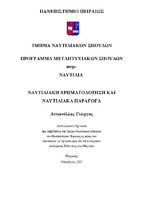Ναυτιλιακή χρηματοδότηση και ναυτιλιακά παράγωγα

Προβολή/
Λέξεις κλειδιά
Θαλάσσιο εμπόριο ; Χρηματοδότηση ; Ναυτιλιακές επιχειρήσεις ; Ναυτιλιακά παράγωγα ; Sea trade ; Financing ; Shipping companies ; Shipping derivativesΠερίληψη
Η ναυτιλιακή βιομηχανία είναι ίσως μία από τις πιο ανταγωνιστικές αγορές τόσο
από πλευράς των απαιτούμενων κεφαλαίων, όσο και λόγω της πολύ μεγάλης
μεταβλητότητας και αμφιβολίας που επικρατεί στις θαλάσσιες μεταφορές και στις τιμές
των ναύλων. Πρόκειται για μία αγορά εντάσεως κεφαλαίου, η οποία αποτελεί ένα διεθνές
επιχειρηματικό περιβάλλον για τις ναυτιλιακές εταιρείες μέσα στο οποίο πρέπει να
δραστηριοποιηθούν και να ανταπεξέλθουν στις νέες προκλήσεις, οι οποίες συνεχώς
εμφανίζονται μπροστά τους.
Εκτός από τα γεγονότα που επηρέαζαν την κίνηση των ναυτιλιακών κύκλων αλλά
και τις δραστηριότητές των ναυτιλιακών επιχειρήσεων, το 2008 οι ναυτιλιακές
επιχειρήσεις κλήθηκαν να αντιμετωπίσουν και μία από τις μεγαλύτερες διεθνείς κρίσεις, η
οποία επηρέασε και εξακολουθεί να επηρεάζει ολόκληρο τον κόσμο και κατ’ επέκταση
και τις θαλάσσιες μεταφορές. Έτσι εκτός από την πτώση του θαλάσσιου εμπορίου, οι
εταιρείες είχαν να αντιμετωπίσουν και την πτώση των διαθέσιμων κεφαλαίων για την
ολοκλήρωση των επενδυτικών τους σχεδίων, διασφαλίζοντας παράλληλα την εύρυθμη
καθημερινή λειτουργία τους.
Η δραστηριοποίηση στη ναυτιλιακή βιομηχανία απαιτεί μεγάλη συγκέντρωση
κεφαλαίων για την ανάπτυξη των επενδύσεων σε αυτόν τον κλάδο, γεγονός το οποίο
ασκεί τεράστια πίεση στον τρόπο λειτουργίας των επιχειρήσεων. Υπό το πρίσμα της
χρηματοοικονομικής κρίσης του 2008 και της συνεχιζόμενης ασταθούς πορείας της
παγκόσμιας οικονομίας, η συγκεκριμένη εργασία θα μελετήσει την ανάπτυξη των
βασικών τρόπων χρηματοδότησης των ναυτιλιακών εταιρειών αλλά και των
εναλλακτικών μεθόδων τους για τη στήριξη της ναυτιλιακής δραστηριότητας.
Αρχικά παρουσιάζεται μία αναδρομική παρουσίαση της ιστορίας της ναυτιλίας
μέχρι σήμερα, διακρίνοντας τους βασικούς σταθμούς της μέσα στους αιώνες, αλλά και τα
γεγονότα που σημάδεψαν την άνοδό της. Ακολουθεί μία ευρεία ανάλυση των κινήσεων των ναυτιλιακών κύκλων που αποτελούν το καλύτερο παράδειγμα της ελαστικότητας της
ναυτιλιακής αγοράς, αλλά ίσως και το βασικότερο υπόδειγμα στο οποίο μπορούν να
στηριχθούν και να μελετήσουν οι ενδιαφερόμενοι για την ναυτιλία στην προσπάθεια να
αποκωδικοποιήσουν την αλληλεπίδραση των αγορών και τους τρόπους αντίδρασης της
ναυτιλίας έναντι των εξωγενών παραγόντων. Εν συνεχεία ακολουθεί η ανάπτυξη της
διαδικασίας της ναυτιλιακής χρηματοδότησης από την αρχή της σύμπραξης μίας
δανειακής σύμβασης, μέχρι την ολοκλήρωσή της, καθώς και η ανάλυση των κινδύνων
που αντιμετωπίζει η κάθε ναυτιλιακή εταιρεία ανάλογα με τη μέθοδο χρηματοδότησης
που θα επιλέξει.
Παρατίθεται ανάλυση των τριών Συμφώνων της Βασιλείας, των βασικών αρχών
που διέπουν την κάθε μία ξεχωριστά αλλά και της επίδρασής τους τόσο στην
χρηματοδότηση των χρηματοπιστωτικών ιδρυμάτων, όσο και την πίεση που ασκείται στις
ναυτιλιακές εταιρείες για την χρηματοδότησή τους μέσω των αυστηρών όρων που
επιβάλλεται στην διακράτηση διαθέσιμων κεφαλαίων από μεριάς των τραπεζών. Τέλος
αναλύονται τα ναυτιλιακά παράγωγα τόσο από την άποψη της αντιστάθμισης του
κινδύνου της μεταβλητότητας των ναύλων όσο και της μετέπειτα κερδοσκοπικής χρήσης
τους. Καθώς επίσης αποτελούν και ένα από τα βασικότερα εργαλεία στην ναυτιλιακή
βιομηχανία παρακολούθησης των ναυτιλιακών δεικτών, πέραν από την προστασία των
συμβαλλομένων έναντι του πιστωτικού κινδύνου.
Έτσι, η συγκεκριμένη εργασία προχωρά στην ανάλυση των βασικών τρόπων
χρηματοδότησης, αναλύοντας τα βασικά πλεονεκτήματα και μειονεκτήματα της κάθε
μεθόδου αλλά και των παραγόντων που την επηρεάζουν και παίζουν καθοριστικό ρόλο
στην διαμόρφωση των δανειακών κεφαλαίων που μπορούν να αντλήσουν από τις
διάφορες μορφές χρηματοδότησής τους. Η παρούσα εργασία θα προσπαθήσει να
προχωρήσει στην αποκωδικοποίηση της λειτουργίας των διαδικασιών εξεύρεσης των
δανειακών κεφαλαίων μίας από τις πιο ανταγωνιστικές αλλά και μεγαλύτερες βιομηχανίες
από άποψη των συγκεντρωμένων επενδυτικών κεφαλαίων, η οποία δραστηριοποιείται και
στις πέντε ηπείρους φέρνοντας όσο πιο κοντά μπορεί τόσο τα εμπορεύματα, όσο και τους
ανθρώπους.


